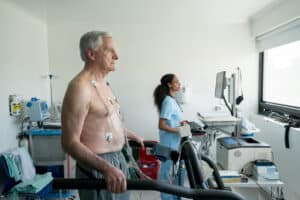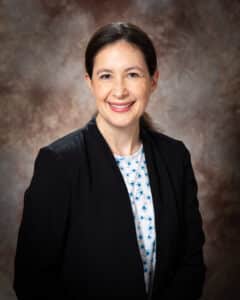Services Offered at Our Transitional Heart Failure Clinic

The Transitional Heart Failure Clinic (THFC) at South Denver Cardiology Associates provides comprehensive care to help heart failure patients manage their heart failure, improve their condition, and enjoy a healthy, happy life despite heart failure. THFC offers patient-centered care that gives you control over your heart failure and empowers you to resume your life on your own terms. We offer a combination of simple lifestyle modifications as well as medications and advanced industry-leading procedures.
We utilize the latest science on heart failure to offer treatment that meets or exceeds rigorous standards of care for heart failure patients. Our approach has proven highly effective in helping patients transition back to normal life after heart failure.
What Is Heart Failure?
Heart failure is when your heart fails to pump out enough blood to meet the body’s needs. Instead, blood collects in the heart rather than entering your bloodstream.
Some of the common symptoms of heart failure include:
- Shortness of breath, typically when you’re active or lying down
- Irregular heartbeat
- Fatigue and weakness
- Decreased mental focus or alertness
- Reduced capacity for exercise
- Swelling in the legs, ankles, feet or belly
- Wheezing
- Persistent cough
- Wet cough, possibly with bloody mucus
- Weight gain from fluid buildup
- Nausea and/or lack of appetite
Talk to your doctor if you have these symptoms. They will direct you to diagnostic testing for heart failure.
How Heart Failure Is Diagnosed

- Blood tests
- Electrocardiogram
- Echocardiogram
- Exercise tests or stress tests
- Cardiac CT
- Cardiac MRI
A blood test is a great start for identifying heart failure, since it’s an easy way to detect proteins related to heart failure and determine whether additional tests are needed. The echocardiogram is an essential tool for diagnosing heart failure. Using sound waves, this test gets an image of your heart as well as the movement of blood through your heart. This lets us determine how well your heart is pumping blood.
Our Approach to Heart Failure Treatment
Heart failure is a serious diagnosis, but it’s also empowering. Now that you know what’s behind your fatigue, inability to concentrate, and reduced exercise capacity, you can take steps to overcome it. Our program is designed to help you understand your condition, present you with the absolute best treatment options for you, and help you achieve your heart failure management goals.
Your first visit to our Transitional Heart Failure Clinic is a 1 ½-hour session where we take a detailed medical history, physical exam, and overview of your medications. We may order additional tests to help us hone in on your exact needs. Then we’ll talk to you about setting goals for your time working with THFC.
Knowledge is power when it comes to managing your heart failure, so education is a big focus at THFC. We’ll teach you everything you need to know to manage your heart failure. In addition, you’ll have same day or next day access to the clinic, and we’ll provide you with IV diuretics if necessary to manage your fluid levels.
By studying all the education and achieving your goals, you can transition out of the THFC and back to your primary care doctor.
Types and Degrees of Heart Failure
Heart failure is when your heart is not pumping out enough blood to your body. This typically occurs because of two causes:
- Systolic heart failure: the heart can’t pump enough blood out to the rest of the body
- Diastolic heart failure: the heart can’t fill with enough blood because of stiff ventricles
In addition, heart failure is divided into three degrees of severity based on the ejection fraction, or the amount of blood the heart pumps out during each contraction:
- Normal: 50-70% of blood is pumped out
- Borderline: 41-49% of blood is pumped out
- Reduced: 40% of blood or less is pumped out
The severity of your heart failure determines the severity of your symptoms. People with normal ejection fraction may not notice any symptoms. Borderline ejection fraction may lead to symptoms when you’re active. People with reduced ejection fraction likely experience symptoms frequently, even during rest.
With proper management and treatment, it’s possible to improve your ejection fraction. That’s one of the main goals of the THFC.
Treatment Options Offered at Our Transitional Heart Failure Clinic
We have many tools to help patients improve their ejection fraction and minimize heart failure symptoms.
Patient Education and Patient Responsibilities

We’ll also expect you to take on certain responsibilities, including:
- Daily weigh-ins
- Blood pressure and pulse monitoring
- Taking your medications
- Limiting your fluids
- Eating a healthy, low-sodium diet
With your help, our team is confident that we can improve your heart failure to help you live a long, satisfying life.
Heart Failure Medications
Depending on your specific conditions, we may manage your heart failure with several medications, including:
- Diuretics, which encourage your body to eliminate fluids
- ACE (angiotensin-converting enzyme) inhibitors
- ARBs (angiotensin receptor blockers)
- ARNIs (angiotensin-receptor neprilysin inhibitors)
- If channel blockers
- Beta blockers
- SGLT-2 (sugar-glucose cotransporter-2) inhibitors
These medications target a wide range of parameters such as blood pressure, heart rate, and weight gain to help improve your heart’s function. This is not an exhaustive list, and the wide range of medications helps us find ones that give results for you without causing too many side effects.
It may take a few tries to find just the right combination, so let us know if you’re having trouble with your medications, and we’ll try something different.
CCM – Industry-Leading Care for Heart Failure Patients
CCM (Cardiac Contractility Modulation) is a new treatment that gives us a tool to help people who aren’t getting good results with lifestyle modification and medications. CCM is similar to a pacemaker, but instead of continuously stimulating your heart to achieve a steady rhythm, CCM is only active during specific treatment sessions, where it stimulates your heart in a way similar to vigorous exercise. This helps your heart get better at pumping blood. Clinical trials show this treatment reduces hospitalizations and improves quality of life, including improving people’s ability to function.
We’ll let you know if this treatment is right for you.
Welcoming Heart Failure Doctor Kelsey Flint

South Denver Cardiology Associates Can Help
If you’re living with heart failure, don’t let symptoms keep you from living your best life for years to come. Let the THFC team help you take control of your heart failure, using a combination of treatments to help you enjoy a better quality of life and better health.
- Lifestyle Factors That Increase Your Risk of Heart Disease - May 26, 2025
- 6 Tips for Exercising Outdoors with a Heart Condition - May 19, 2025
- Lifestyle Changes That Can Help Manage Arrhythmia - April 30, 2025
Sign Up
As with any health concerns, your specific treatment program should be discussed thoroughly with your primary care physician as well as any specialists who may need to be consulted – like a cardiologist.
Sign Up
